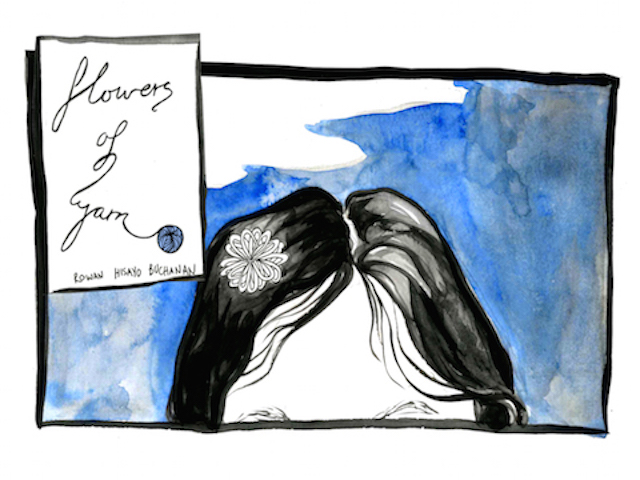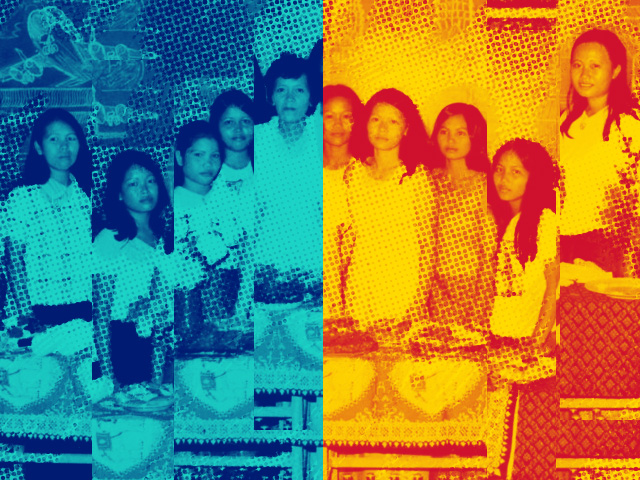“Spock was good in math and science; so was I. Spock tended to suppress his emotions (his human side), and so did I.” Fred Ho on coming of age.

May 16, 2014
This essay was originally published in Boyhood, Growing Up Male: A Multicultural Anthology, edited by Franklin Abbott (Crossing Press, 1993).
My early childhood memories begin at around the age of three. The second experience in life that I can remember was my first pain with white racism. At a preschool program, I remember my sandbox being segregated, how the white schoolteacher (at that time, white, black or Asian / yellow had no meaning) deliberately told the other kids (all white) not to play with me. But the feelings of isolation and avoidance by the other kids, and the pain I felt from this one particular teacher for singling me out, would remain with me for the rest of my life.
Around the time I started elementary school, I became aware that I was Chinese. Again, racism provoked a self-awareness of difference when the other school kids (except for one other Chinese boy) made fun of and laughed at me for eating at lunch a Chinese bao (or steamed flower-shaped bun). The kids pointed at my favorite snack and ridiculed me / it: “Yecch, he’s eating play dough!” From then on, a feeling of shame for being Chinese would take hold, even though I loved the foods my mom prepared. The char sui (Chinese roast pork), lop cheong (Chinese sausage), bing bing and various other baos (fried and steamed buns) were my favorites, more so than American spaghetti or hamburgers (which I blamed my mom for not knowing how to make authentically). My mother tells me that before entering public school I spoke and understood more Chinese than English, but after a few months of first grade, and the painful feeling of being different, I actively tried to give up everything to do with being Chinese. I wanted to be liked, to be accepted, to do well and be respected.
“White got the might / White is right / Might as well be White…” It wasn’t until years later that I became clear about the pressures of white assimilation, self-denial, and self-hatred. By turning away from my Chinese American identity, I became a banana (yellow on the outside, white on the inside): actively disavowing my heritage and people and identifying with the oppressor in toto (physical appearance, politics, values, etc.).
My parents didn’t want me to lose my Chinese heritage and pride. They never understand what they termed “Americanization,” or what I now call “whitification.” They were immigrants. My father, a university professor, was seemingly bicultural: he was fluent in both Chinese and English (although he always had an accent), a tenured professor who taught Chinese political science. But he was actually culturally schizophrenic: he self-identified as a Confucian scholar who had to culturally lower himself to function in white academia, frustrated by the professional / career politics required to advance. While he was the most published of all the senior faculty members in his department, he was the least paid. He would take out his frustration with the job (which included white students making fun of him for his accent) and be a Chinese feudal patriarch at home. We—my mom, myself, and my two sisters—were the victims of his fulminations and violent domination. He battered my mom for her inability to speak English, for her wanting the independence that she perceived white middle-class wives possessed. One of my first revolutionary insurrections was when, at the age of 17, I opposed my father’s physical abuse of my mother. To get him to stop hitting her, I fist fought him, giving him two black eyes. I remember the next day he went into work wearing dark sunglasses, not wanting to miss giving a lecture as the dutiful teacher.
Because my home life was so awful, it was very important to be accepted at school by my peers in a white college town. I parted my hair, tried to put in a wave. I tried to become a fan of white popular music. Strangely, when Star Trek came on network TV in the mid-to-late 1960s, I came to identify with Mr. Spock, the half-Vulcan, half-human first officer—the “alien.” Spock was good in math and science; so was I. Spock tended to suppress his emotions (his human side), and so did I. And Vulcans and Asians bore a similar physical resemblance. For two or three Halloweens, I just wore a blue turtleneck shirt bearing a Starfleet insignia I had made with crayons and cardboard. When the other kids shouted “trick or treat,” I gave a Vulcan hand salute and stoically proclaimed, “Live long and prosper.” Only a few white neighbors asked me, “What are you supposed to be?” (Interestingly, I never identified with Sulu, the Asian on the show; I think because he was so token, his Asian-ness completely peripheral or nonexistent, unlike Chekov or Scotty, who spoke with accents to identify their cultural / national heritages, or Uhura, who occasionally dressed in African garb or who viewers knew spoke Swahili. Sulu was completely culturally de-ethnicized.)
All the other Asian males on TV were pathetic stereotypes: comic relief servant or sidekick types like Fuji and Hop Sing, or evil inscrutables like Hawaii Five-O’s nemesis, the red commie Wo Fat (never played by an Asian). I tried to be like David Carradine as Kwai Chang Caine in Kung Fu, but the fake martial arts couldn’t make up for the even more slant eyes and yellow skin makeup (the racist Hollywood / American entertainment tradition of yellow-face).
The one exception on TV while growing up was Bruce Lee as Kato on The Green Hornet. Kato had a thick Cantonese accent, even in his common one-liner: “Whele to, Boss?” (Chinese makes “r” sounds come out like “l.”). Raised in the boys-will-be-boys heterosexual socialization of male aggressiveness and heroism, I craved an action-adventure character like Kato, who could really kick ass. I always secretly wondered why Kato wasn’t the boss instead of the Green Hornet. But after all, I still hadn’t begun to question the notion of the white man’s world.
Two significant factors worked to rid me of the white / banana syndrome: first, no matter how hard I tried to be racially effacing, I couldn’t escape from racism at all levels: from jeers and taunting to outright restrictions—starting with the segregated sandbox. Second, the social changes of the late 1960s brought the first African American teacher to my junior high. She wore a big Afro, projected militant black pride, and brought about the first “Black Experience” class that exposed me to African American literature, including The Autobiography of Malcolm X. It was Malcolm X’s life and ideas that awakened my political consciousness: that I / we are victims of a system of white supremacy and racism. For the first time, I began to theorize my personal experience to the level of social analysis and radical political concepts; it never could remain at the level of feel-good politics or “identity politics.” More and more as a I struggled to change myself through changing the social environment around me, I came to understand the structural and systematic roots of the oppression of “people of color,” but also of the world’s majority: the oppression of women, workers of all nationalities, entire peoples. The high level of political debate and struggle in the “movement” of the United States at this period eventually brought me into Marxism as I discarded my anti-white nationalism or “Third-World consciousness” for a more dialectical and thus scientific analysis. I am not anti-white, but anti-white supremacy. I am pro-liberation for women, gays, or oppressed nationalities (what I prefer to call “people of color” as it specifically locates our political conditions as oppressed, thus belying notions of “reverse discrimination,” etc.), and I’m for socialism. I reject the homophobia, racism, and sexism that also have infected parts of the American Left and the socialist movements around the world. While I believe that ultimately our struggle is for political and economic structural or systemic changes, I also uphold the critical importance of cultural change: creating new values and human relations and expressions. In my present position as composer, baritone saxophonist, and bandleader of the Afro Asian Music Ensemble, I insist upon and work toward an audience that is not majority white. This is integral to revolutionary change.
More in the Counterculturalists Tribute to Fred Ho:
Kanya D’Almeida, “To Walk the Gauntlet of Fire: Remembering A Mentor”
Fred Ho, “Beyond Asian American Jazz: My Musical and Political Changes in the Asian American Movement”
Marie Incontrera, “All The Colors of Life: A Celebration of Fred Ho”
Bill V. Mullen, “A Hundred Flowers of Revolutionary Hope”
Diane Fujino, “Fred Ho’s Radical Imagination”



